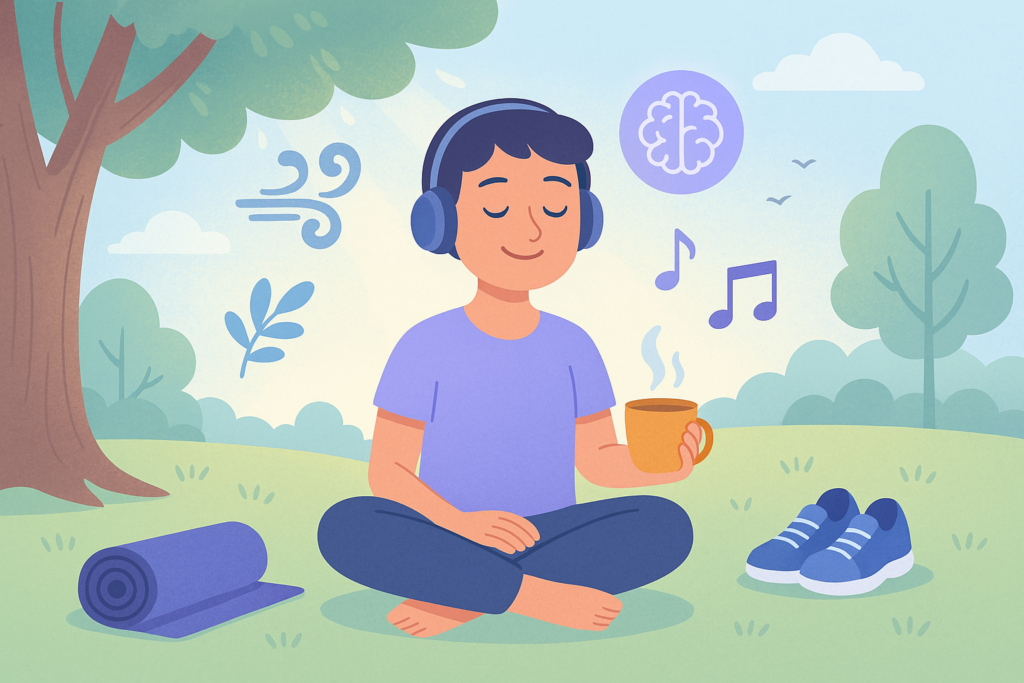Ever thought you could change your health without big changes? Many think you need a total lifestyle makeover to be healthier. But, research shows small steps can make a big difference.
In this article, we’ll show you how to live healthier with easy tips. You’ll learn about better eating and fun exercise. These habits can change your life for the better, without feeling too hard.
Understanding What a Healthy Lifestyle Means
A healthy lifestyle is more than just good habits. It’s a complete approach to feeling your best. It includes being active, eating right, taking care of your mind, and being social. This way, you improve your well-being by balancing different parts of your life.
Definition of a Healthy Lifestyle
The definition of a healthy lifestyle means being active for at least 30 minutes, several times a week. It also means eating well, with lots of fruits, veggies, and whole grains. Taking care of your mental health is key, too. This includes managing stress and having good friends.
By following these steps, you lay the groundwork for a healthier life.
Benefits Beyond Weight Loss
Many think the main goal of healthy living is to lose weight. But the benefits of healthy living go way beyond that. Eating well and staying active can lower your risk of serious diseases like diabetes and heart disease. You’ll also feel happier, have more energy, and live a better life.
To start making these changes, check out ways to maintain a healthy lifestyle. Add them to your daily routine.
Simple Nutrition Guidelines for Daily Living
Improving your nutrition can greatly boost your health. Focus on whole foods and balanced nutrients for a strong base. This approach helps you live a healthier life for the long term.
Importance of Whole Foods
Whole foods are minimally processed and close to nature. They include fruits, veggies, whole grains, and lean proteins. Adding these to your diet gives your body the vitamins and minerals it needs.
Choose foods like quinoa, sweet potatoes, and spinach. They are packed with nutrients and offer many health benefits.
Balancing Macronutrients
Macronutrients like proteins, fats, and carbs are key for energy and body functions. Proteins help repair muscles, fats support hormones, and carbs give energy. The 40-30-30 rule (40% carbs, 30% protein, 30% fat) helps balance your intake.

Easy Ways to Incorporate Exercise into Daily Life
Making physical activity a part of your daily routine is key to better health. Finding activities you enjoy makes exercise a fun part of your day. Try dancing, cycling, or walking to make it more enjoyable.
Finding Activities You Enjoy
Doing exercises you like boosts your motivation. Here are some fun activities:
- Dancing: A fun way to move your body while enjoying music.
- Biking: Perfect for exploring your surroundings.
- Swimming: A low-impact exercise that is refreshing.
- Group classes: These provide social interaction along with fitness.
When you enjoy what you’re doing, it’s easier to stay active every day.
Tips for a Consistent Routine
Having a reliable routine is key to keeping fit. Here are some helpful tips:
- Set realistic goals: Start small and gradually increase intensity and duration.
- Schedule workouts: Treat them as unmissable appointments in your calendar.
- Stay flexible: If plans change, adjust your activities instead of skipping them.
- Track your progress: This can motivate you by showing how far you’ve come.
By following these tips, you can improve your exercise routines and build lasting habits for a healthy lifestyle.

The Role of Hydration in Your Health Journey
Knowing how important hydration is in your life is key to staying healthy. Drinking enough water helps your body work better. It boosts digestion, brain function, and energy, all important for a good life.
Recommended Daily Water Intake
Doctors say adults should drink 8 to 10 cups of water a day. Your needs can change based on your age, weight, and how active you are. Paying attention to how you feel can help. Using a water bottle can make drinking water easier. Staying hydrated is good for your health.
Signs of Dehydration to Watch For
Knowing the signs of dehydration is important. Look out for:
- Dry mouth
- Fatigue
- Decreased urine output
If you notice these signs, drink more water. Reminders or apps can help you stay hydrated. This improves your health journey.

Prioritizing Mental Well-Being
Mental well-being is key to a balanced and healthy life. Adding mental health strategies to your daily life boosts emotional strength and happiness. Mindfulness and social connections are vital for this.
Mindfulness and Meditation Practices
Mindfulness tips like meditation help manage stress and improve emotional control. Regular practice can lower anxiety and depression. Techniques like deep breathing or guided imagery clear your mind.
These methods not only sharpen focus but also bring inner peace.
Importance of Social Connections
Strong social connections greatly impact your mental health. Meaningful relationships create a support system that boosts well-being. Activities in the community or time with loved ones build emotional strength.
These interactions give a sense of belonging, essential for a fulfilling life.

Sleep: The Unsung Hero of Healthy Living
Understanding the sleep importance in your wellness journey is key. Quality sleep is essential for both physical and mental health. Adults need 7 to 9 hours of sleep each night.
Not getting enough sleep can cause weight gain and trouble focusing. By using good sleep strategies, you can boost your health and daily performance.
Recommended Sleep Duration
The National Sleep Foundation says different ages need different amounts of sleep. For adults, 7 to 9 hours is best. This time lets your body fix itself and get ready for the next day.
Not enough sleep can hurt your health and brain power.
Tips for Improving Sleep Quality
To better your sleep, try these wellness tips:
- Go to bed and wake up at the same time every day.
- Make a calming bedtime routine to tell your body it’s time to sleep.
- Stay away from screens for at least an hour before bed. Blue light stops melatonin production.
- Make your sleep area dark, cool, and quiet for better sleep.
- Do physical activities during the day, but not right before bed.
Adding these sleep tips to your life can greatly improve your health, energy, and overall wellness.
Managing Stress Effectively
Learning to manage stress is key for your health. Stress impacts both your body and mind. It’s important to know what stresses you out. Common stressors include work, family, and daily commutes.
Spotting these stressors is the first step to better mental health strategies.
Identifying Your Stressors
To better handle stress, start by listing what makes you anxious or overwhelmed. This could be work, family, or even your commute. Keeping a journal helps track these stressors and how you react to them.
This insight helps you tackle what’s stressing you out.
Practical Stress-Relief Techniques
There are many stress-relief techniques you can add to your daily life. Exercise is a great way to reduce stress. It could be a quick walk or a workout session.
Mindfulness, like deep breathing or meditation, also helps. Yoga or tai chi mix movement with mindfulness.
Talking to friends or loved ones is another effective way to manage stress. Creative activities like painting or gardening can also help. For more ideas, check out this resource on simple ways to reduce stress in your daily life.
By using these methods, you’ll build a strong foundation for dealing with stress. This leads to a more balanced and fulfilling life.
The Importance of Routine in Health
Creating a daily routine is key to a healthy life. It helps you fit in good habits easily. This way, you can reach your wellness goals and handle tough times better.
Structuring Your Day for Success
Starting with a daily plan is a smart move for health. A set schedule helps you stay organized and manage your time well. Here are some tips to help you succeed:
- Prepare healthy meals in advance to avoid bad choices.
- Book exercise sessions like you would any other important meeting.
- Stick to a sleep schedule to get better rest.
Incorporating Healthy Habits Gradually
Adding new habits slowly helps you stick to them longer. Begin with small changes, like:
- Adding a new fruit or veggie to your meals each week.
- Starting a 10-minute walk each day.
- Going to bed at the same time every night.
This slow method helps you build a healthier life without feeling overwhelmed. Being flexible in your routine lets you adjust when needed. It keeps you on track for lasting wellness success.
Building a Support System
Creating a strong support system is key to reaching your healthy living goals. Connecting with friends, family, and community members who have similar goals can boost your motivation. This network provides the encouragement you need, making your health journey easier.
Being part of this support system helps keep you motivated and accountable. It makes your health goals feel less overwhelming and more achievable.
Finding Your Village of Support
To find your support group, look into local fitness groups, clubs, or health workshops. Search for online communities that match your interests, like nutrition, exercise, or mental health. Being around people who support you helps you stay on track with your goals.
Feel the positive energy and shared experiences these groups offer. They empower you to keep moving forward.
Sharing Goals with Friends and Family
Telling your loved ones about your goals can make you more committed and accountable. Sharing your healthy living goals invites others to support you. Set up regular check-ins to talk about your progress and any challenges you face.
Encourage them to share their goals with you too. This creates a cycle of encouragement and support.
Tracking Your Progress
Keeping an eye on your progress is key in your health journey. By checking your achievements and habits, you stay motivated. There are many ways to do this, like using fitness apps, health trackers, or journaling.
Each method gives you special insights. These insights help you stick to your goals.
Methods for Monitoring Your Health Journey
Today, we have many tools to track our progress. Fitness apps give you real-time data on your activity and diet. Smartwatches let you monitor your health all day and remind you to move.
But, journaling is also a great choice. Writing down your daily habits helps you reflect. It lets you see patterns over time.
The Power of Journaling
Journaling can really boost your health journey. It helps you understand yourself better. By writing about your meals, workouts, and feelings, you learn a lot.
This reflection helps you spot areas to improve. It keeps you accountable and motivated. Adding journaling to your routine can change how you track progress.
Celebrating Small Wins on Your Journey
As you journey towards a healthier life, it’s key to celebrate small victories. Every achievement, big or small, helps you move closer to your goals. It shows you’re serious about making positive changes.
By celebrating, you get to see how far you’ve come. It boosts your motivation to keep going. It’s a chance to reflect on your hard work and stay focused on your goals.
How to Acknowledge Your Achievements
There are many ways to celebrate your progress. You could keep a journal of your health wins, share them with loved ones, or treat yourself when you reach a goal. These actions not only make you feel good but also keep you committed to a healthy lifestyle.
Remember, every small step is a step closer to your big goals. It’s all about progress, not perfection.
Staying Motivated Through Challenges
Challenges will come your way. It’s important to see them as chances to learn, not as obstacles. Celebrating your small wins helps you stay strong and motivated, even when things get tough.
Keeping a positive mindset helps you stay on track with your healthy living goals. It encourages you to keep moving forward, no matter what.



